|
WUDU - Ablution
- WUDOO
Cleanliness (Taharah) is an important precondition of Islamic worship. Wudu
is an essential part of Cleanliness. Salah (prayer) is not valid without Wudu' or
Tayammum(dry Ablution).
Islam encourages cleanliness. To ensure this
is preformed, it is mandatory that your body and clothing be clean before
performing your salaat. Your prayer will not be valid unless your body and
clothing are clean. Clothing must be considered tahir and removed of all
impurities. Impurities include blood, urine, and excrement.
Allah says in the Qur'an :
"Surely Allah loves those who turn to Him and those who care for cleanliness"
(2:222).
Purification Before Salaat
:
Allah's Messenger SAW said,
The key to Paradise is prayer and the key to prayer is cleanliness (Ablution).
Tirmidhi, Transmitted Ahmad, Narrated Jabir ibn Abdullah
A desert Arab came to Allah's Apostle SAW and asked him
about ablution. He demonstrated (washing each part of his body) thrice, and then
said: That is (the method) of the ablution. And he who does more than this has
done wrong, transgressed the limit and has oppressed (himself). [Tirmidhi
#417, Transmitted by Nasa'i, Ibn Majah, and AbuDawud transmitted something to
the same effect.]
Allah (SWT) said, "O
you who believe! When you intend to offer prayer, wash your faces and your hands
(fore-arms) up to the elbows, rub (by passing wet hands over) your heads, and
(wash) your feet up to ankles�" (Al-Ma'idah 5:6)
The Prophet (SAW) said,
"Allah does not accept prayer without purification ..." (Sahih - Muslim
and others)
Hadith - Bukhari 1:161, Narrated Humran
(The slave of
'Uthman) I saw 'Uthman bin 'Affan asking for a tumbler of water (and when it was
brought) he poured water over his hands and washed them thrice and then put his
right hand in the water container and rinsed his mouth, washed his nose by
putting water in it and then blowing it out. Then he washed his face and
forearms up to the elbows thrice, passed his wet hands over his head and washed
his feet up to the ankles thrice. Then he said, "Allah's Apostle SAW said
'If anyone Performs ablution like that of mine and offers
a two-rak'at prayer during which he does not think of anything else (not related
to the present prayer) then his past sins will be forgiven.'
" After performing the ablution 'Uthman said, "I am going to tell you a
Hadith which I would not have told you, had I not been compelled by a certain
Holy Verse (the sub narrator 'Urwa said: This verse is:
'Verily, those who conceal the clear signs and the guidance which we have sent
down...)' (2:159). I heard the Prophet SAW saying,
'If a man performs ablution perfectly and then offers the compulsory
congregational prayer, Allah will forgive his sins committed between that
(prayer) and the (next) prayer till he offers it.' "
The Noble Qur'an - Al-M�'idah 5:6
O
you who believe! When you intend to offer As-Sal�t (the prayer), wash your faces
and your hands (forearms) up to the elbows, rub (by passing wet hands over) your
heads, and (wash) your feet up to ankles. If you are in a state of Jan�ba (i.e.
had a sexual discharge), purify yourself (bathe your whole body). But if you are
ill or on a journey or any of you comes from answering the call of nature, or
you have been in contact with women (i.e. sexual intercourse) and you find no
water, then perform Tayammum with clean earth and rub therewith your faces and
hands. All�h does not want to place you in difficulty, but He wants to purify
you, and to complete His Favour on you that you may be thankful.
The Noble Qur'an - At-Tauba 9:108
...And All�h loves those who make themselves clean and pure (i.e. who clean
their private parts with dust [i.e. to be considered as soap) and water from
urine and stools, after answering the call of nature].
The Noble Qur'an - Al-Baqarah 2:222
They ask you concerning menstruation. Say: that is an Adha
(a harmful thing for a husband to have a sexual intercourse with his wife while
she is having her menses), therefore keep away from women during menses and go
not unto them till they have purified (from menses and have taken a bath). And
when they have purified themselves, then go in unto them as All�h has ordained
for you (go in unto them in any manner as long as it is in their vagina). Truly,
All�h loves those who turn unto Him in repentance and loves those who purify
themselves (by taking a bath and cleaning and washing thoroughly their private
parts, bodies, for their prayers, etc.).
The Noble Qur'an - At-Tauba 9:28
O
you who believe (in All�h's Oneness and in His Messenger (Muhammad SAW)! Verily,
the Mushrik�n (polytheists, pagans, idolaters, disbelievers in the Oneness of
All�h, and in the Message of Muhammad SAW) are Najasun (impure). So let them not
come near Al-Masjid-al-Har�m (at Makkah) after this year, and if you fear
poverty, All�h will enrich you if He will, out of His Bounty. Surely, All�h is
All-Knowing, All-Wise.
Water
Restrictions
The following
water only, is permissible for Wudu. Natural water such as rain, lakes, rivers
(any moving water) and tap water. Only in the following situation are you
permitted to perform prayer while your body or clothing is najis (dirty). If you
are injured and the body becomes dirty and it is difficult to wash the clothing
or body. If you do not know that your body or clothing is najis (dirty), and
after the Salaat you realizes it. If you have made wudu and should come in
contact with blood that is less then the size of the tip of your thumb. Someone
is helpless and must pray with a najis body or clothing; for example, one does
not have water to clean the clothing or body.
WUDU - Minor
Impurities and the Purification Method in text details, 1 to 10
The purifying of
your body is called wudu. The passing of excrement, gas, urine, vomiting,
bleeding, touching of sexual organs without clothing, falling into a deep sleep,
and laughing loudly during salaat can all break your wudu. Once wudu is
preformed and not broken you may perform multiple prayers. Here are some
instructions to follow for performing wudu.
Before starting the actions of
wudu it is necessary to make niyyah. Make niyyah that the act of performing wudu
is for the purpose of purity only. Niyyah should be made in the heart because it
is an action of the heart and not of the tongue. Niyyah by words is not approved
by the Prophet (SAW).
Prophet Muhammad (SAW) said,
"Verily the actions are by intention and there is for
everyone only what he intended..." (Sahih - Fath-ul-Baaree and Muslim)
At-Tasmiyyah (Mentioning Allah's Name)
Call upon Allah
at the start of Wudu by saying Bismillah (silently or aloud).
Prophet Muhammad (SAW) said,
"There is no wudu for him who does not mention Allah's
name upon it." (Sahih - Ibn Maajah, At-Tirmithee, Abu Dawood, and others)
1. Wash
the hands 3 times up to the wrists with water, allowing water to run between the
fingers.
Humran (RA) narrates that Uthman (RA) called
for water to make wudu and washed his hands three times... then said,
"I saw Rasoolullah (SAW) make wudu just as I have made
wudu." (Sahih - Al-Bukhari and Muslim)
2.
Rinse the mouth with water three times.
Prophet Muhammad (SAW) said,
"When you make wudu then wash your mouth." (Sahih -
Al-Baihaqee)
3.
Clean the nostrils by sniffing water in then out 3 times.
The Prophet (SAW) said,
"When one of you makes wudu then let him enter water into his nose, then expel
it." (Sahih - Al-Bukhari, Muslim, Abu Dawood)
Abd Khair (RA) said, "We
were sitting looking towards Ali (RA) - as he made Wudu - and he entered into
his mouth a handful of water with his right hand and washed his mouth and nose,
then expelled it from his nose with his left hand - he did that three times,
then said, 'Whoever would like to see the way of purification of Rasoolullah
(SAW) - then this is his purification.'" (Sahih - Ad-Daarimee)
4.
Clean the face 3 times from the top of the forehead down to the chin and from
ear to ear.
Allah (SWT) said, "O
you who believe! When you intend to offer prayer, wash your faces and your hands
(fore-arms) up to the elbows, rub (by passing wet hands over) your heads, and
(wash) your feet up to ankles�" (Al-Ma'idah 5:6)
Humran ibn Abaan (RA) narrates that Uthman
(RA) called for water to make wudu and so mentioned the way in which the Prophet
(SAW) made wudu. Humran (RA) said, "Then he washed his
face three times." (Sahih - Al-Bukhari, Muslim)
5. Running Water Through the Beard with the Fingers
Take a handful of water into the right hand and enter it below the chin and
rub it through the beard making sure to get all the way down to the roots of the
hair.
Anas (RA) narrates that the Prophet (SAW), when he made wudu, used to take a
handful of water and enter it below his chin and rub it through his beard and
said, "This is what my Lord - the Great and Exalted - has ordered me to do."
(Sahih - Abu Dawood, Al-Baihaqee, Al-Haakim)
6.
Wash the arms three times, from the elbows right arm first, then left.
Allah (SWT) said, "O
you who believe! When you intend to offer prayer, wash your faces and your hands
(fore-arms) up to the elbows, rub (by passing wet hands over) your heads, and
(wash) your feet up to ankles�" (Al-Ma'idah 5:6)
Nu'aim ibn Mijmar (RA) said,
"I saw Abu Hurairah make wudu - he washed his face and
completed the wudu, then washed his right hand until he reached the upper arm,
then his left hand till he reached the upper arm" - then in the end of the
Hadith he said: "This is how I saw Rasoolullah (SAW) make wudu.'" (Sahih
- Muslim)
7.
Moisten the hands and pass them over the head from the forehead to the back
of the hairline, and from there back to the forehead.
Allah (SWT) said, "O
you who believe! When you intend to offer prayer, wash your faces and your hands
(fore-arms) up to the elbows, rub (by passing wet hands over) your heads, and
(wash) your feet up to ankles�" (Al-Ma'idah 5:6)
The Prophet (SAW) wiped
his head with his two hands, moving them forwards and backwards - beginning with
the front of the head and (wiping) with them up to his nape then he (SAW)
returned them to the place from which he began. (Sahih Al-Bukhari,
Muslim, At-Tirmithee, and others)
*Wiping Over the Turban
Men who wear a head piece that
is difficult to remove (such as a turban) should wipe over the head covering. Do
this one time.
Amr ibn Umayyah (RA) said,
"I saw Rasoolullah (SAW) wipe over his turban and leather
socks." (Sahih - Al-Bukhari and others)
*Wiping Over the Turban and Forelock
If part of the head is
uncovered and it is normally so, then it is preferable to wipe over the part
that is uncovered along with the turban. Do this one time.
Shu'bah (RA) said,
"The Messenger of Allah (SAW) made wudu and wiped over the
front portion of his scalp, his turban and his socks. (Sahih - Muslim)
*Woman's Head Cover
As for the woman's head cover,
it is also permissible to wipe over it. This would be the case of a woman that
has no private place for wudu (i.e. where non-Mahram men or non-Muslim women may
see them). Do this one time. Umm Salamah (RA) used to wipe over her head cover .
(See'al-Mughnee' - Ibn Mundhir)
8.
Wipe the earlobes with the fore-fingers cleaning the inside of the ears and
the thumbs cleaning the external side.
Prophet Muhammad (SAW) said,
"The two ears are a part of the head." (Sahih -
At-Tirmithee, Abu Dawood, and Ibn Maajah)
From Abdullah ibn Amr (RA) - about the way of
performing wudu - he (SAW) said, "Then he (SAW) wiped his
head and entered his two forefingers into his ears and wiped the backs of his
ears with his thumbs". (Sahih - Abu Dawood, An-Nasaa�ee, Ibn Maajah, Ibn
Khuzaimah)
Ar-Rabee bint Mu'awwidh (RA) reported that
the Prophet (SAW), "Wiped his head with water remaining in
his hand". (Hasan - Abu Dawood and others)
9.
Wash both feet beginning with the right foot up to the ankles allowing the
water to run between each toe.
Allah (SWT) said, "O
you who believe! When you intend to offer prayer, wash your faces and your hands
(fore-arms) up to the elbows, rub (by passing wet hands over) your heads, and
(wash) your feet up to ankles�" (Al-Ma'idah 5:6)
"Ibn Umar (RA) said,
"Rasoolullah (SAW) fell behind us and then came upon us during a journey, then
we found him and it was time for 'Asr - so we began to make Wudu and wipe over
our feet, so he (SAW) called out at the top of his voice, 'Woe to the ankles
from the Fire. (two or three times)'" (Sahih - Al-Bukhari and Muslim)
"Al-Mustaurad (RA)
said, "When the Prophet (SAW) made wudu he would enter the water between his
toes with his little finger." (Sahih - Abu Dawood, At-Tirmithee, and Ibn
Maajah)
*Wiping Over the Foot Covering
Wiping over the top of the foot covering with
wet hands instead of washing the feet is allowed, provided that the foot
covering has been put on after performing wudu that included washing the feet.
Wipe the top of each foot one time, using the right hand for the right foot and
the left hand for the left foot. This is allowed for 24 hours from the time of
wudu, if not traveling. After this time the feet must be washed. It is allowed
for 3 days from the time of wudu, if traveling. After this time the feet must be
washed.
Amr ibn Umayyah (RA) said,
"I saw Rasoolullah (SAW) wipe over his turban and leather
socks." (Sahih - Al-Bukhari and others)
Drying the Body-Parts After Wudu
Drying the body-parts after wudu is a
desirable action.
Aishah (RA) said,
"Rasoolullah (SAW) had a cloth which he used to dry himself with after making
wudu." (Sahih - An-Nasaa'ee)
How Many Times For Each Action in Wudu
Each detail of wudu has been performed by
Prophet Muhammad (SAW) once, twice or three times (except wiping of head and
ears, these should only be done once). Washing each body-part once is obligatory
- and the second and third washings are Sunnah - and it is better to wash three
times so as to follow the Sunnah of the Prophet (SAW).
Ibn Abbas (RA) said,
"Rasoolullah (SAW) made wudu (washing each part) once." (Sahih -
Al-Bukhari)
Abdullah ibn Zaid (RA)
narrates that the Prophet (SAW) made wudu (washing each part) twice.
(Sahih - Al-Bukhari)
Uthman (RA) recorded
that he (SAW) washed each of the parts three times. (Sahih - Al-Bukhari
and Muslim)
Beginning With the Right
Always wash the right hand before the left
hand. Always wash the right foot before the left foot. Always wash the right
side before the left side.
Aisha (RA) said,
"Rasoolullah (SAW) used to like to begin with the right in putting on shoes,
combing his hair, in purification and in all of his affairs." (Sahih -
Al-Bukhari, Muslim, and others)
Reading Du'as (Supplications) After Wudu
After wudu, first say aloud or silently:
"Ash hadu an la ilaha illal
lahu wah dahu la shareeka lahu wa ash hadu an-na muhammadan 'abduhu wa rasulhu"
(I testify that there
is none worthy of worship except Allah, and I testify that Muhammad (SAW) is His
slave and Messenger)
Then say aloud or silently:
"Allah hum maj 'alnee minat
taw-wabeena, waj 'alnee minal muta tah-hireen."
(O Allah, make me one of
those who constantly repents to You and of those who purify themselves)
Rasoolullah (SAW) said,
"None of you makes wudu and completes the wudu then says: "Ash hadu an la ilaha
illal lahu wah dahu la shareeka lahu wa ash hadu an-na muhammadan 'abduhu wa
rasulhu" except that all eight Gates of Paradise are opened for him - so that he
enters by whichever he pleases." (Sahih - Muslim, Abu Dawood,
At-Tirmithee, An-Nasaa'ee, Ibn Maajah)
"Allah hum maj 'alnee
minat taw-wabeena, waj 'alnee minal muta tah-hireen." (Sahih -
At-Tirmithee)
WUDU - 1/10 steps -
Minor Impurities and the Purification Method in text with pictures
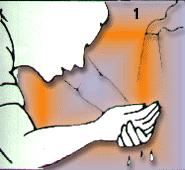
1. First make Niyyah (Intention) that you are making Wudu' for Salah
N.B
the place of intention is the heart
and begin saying. "Bismillah.." (In the name of Allah, the most merciful and the
most kind).
Wash both hands up to the wrist three times,
making sure that water has reached between the fingers.
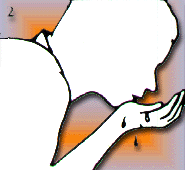 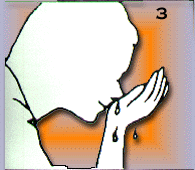 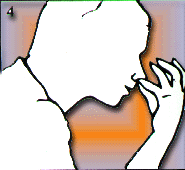
2.3,4 rinsed ur mouth and cleaned ur nose with water (three times)
Put a handful of water into your mouth and back it Sniff water into your
nostrils three times to clean them and then wash the tip of the nose.
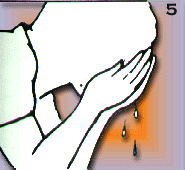 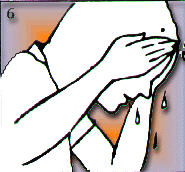
5,6 Wash your face three times from right ear to left ear and from forehead
to throat.
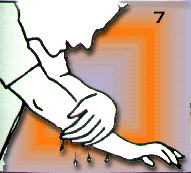
7. Wash your right arm and then your left arm thoroughly from wrist up to
elbow three times.
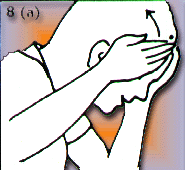 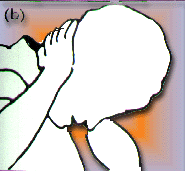
( 8 a & b) Move the wet palms over the head from the top of forehead to the
back of the head.
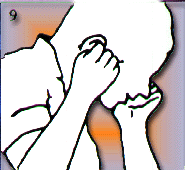
9) Pass the wet tips of index fingers into the grooves and holes of both ears
and also pass the wet thumbs behind the ears
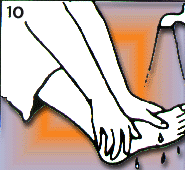
10. Finally, wash both feet to the ankles starting from the right, making
sure that water has reached between the toes and all other parts of the feet.
At the end of the above steps recite:
"Ash hadu an la ilaha illal
lahu wah dahu la shareeka lahu wa ash hadu an-na muhammadan 'abduhu wa rasulhu"
Meaning: I testify that there
is none worthy of worship except Allah, and I testify that Muhammad (SAW) is His
slave and Messenger
Then say aloud or silently:
"Allah hum maj 'alnee minat
taw-wabeena, waj 'alnee minal muta tah-hireen."
Meaning: O Allah, make me one of those
who constantly repents to You and of those who purify themselves
You Should repeat your Wudu after :
1. Natural discharge (e.g. urine, stool, wind and the like)
2. Flow of blood or pus from any part of the body.
3. Full mouth vomiting
4. Falling asleep.
===========================================
Al-Ghusl (The Washing Or Bath) -
Major Impurities and the Purification Method
The procedure is as follows: Begin with the
name of Allah as for Wudu.
Wash the hands and the affected parts of the body with water to remove any
impurity. Perform Wudu as above.
The wash the whole body three times, using clean water for each wash.
Hadith -
Muwatta 2.74
Yahya related to me from Malik from Abu'n Nadr, the mawla of Umar ibn Abdullah
that Abu Salamaibn Abdar-Rahman ibn Awf related that he had asked A'isha, the
wife of the Prophet SAW what made ghusl obligatory. She said, "Do you know what
you are like, Abu Salama? You are like a chick when it hears the cocks crowing
and so crows with them. When the circumcised part passes the circumcised part,
ghusl is obligatory."
Hadith - Bukhari 1:228, Narrated 'Aisha
Fatima bint Abi
Hubaish came to the Prophet and said, "O Allah's Apostle I get persistent
bleeding from the uterus and do not become clean. Shall I give up my prayers?"
Allah's Apostle SAW replied, "No,
because it is from a blood vessel and not the menses. So when your real menses
begins give up your prayers and when it has finished wash off the blood (take a
bath) and offer your prayers." Hisham (the
sub narrator) narrated that his father had also said, (the Prophet told her):
"Perform ablution for every
prayer till the time of the next period comes."
Hadith - Bukhari 1:327, Narrated 'Aisha
The Prophet SAW
said to me, "Give up the prayer when your menses begin and
when it has finished, wash the blood off your body (take a bath) and start
praying."
To remove major
impurities from your body, you are required to perform Ghusl, or a full shower.
The following acts require Ghusl. The emission of fluids from male or female
sexual organs, one is defiled as a result of nocturnal
emission (or a wet dream), menstruations,
sexual intercourse, masturbation, child birth or when
entering into the fold of Islam.
To perform
Ghusl you should combine the procedures of Wudu to maximize the level of purity.
1. Begin with the name of
Allah as for Wudu.
2. Begin
with clean flowing water, stand or squat in the water. Do not sit in the water.
3. Make
the intention (Niyyat Ghusl) to perform Ghusl.
4. Wash
the hands 3 times up to the wrists with water, allowing water to run between the
fingers.
5. Wash
private areas with the left hand.
6. Wash
the hands again 3 times up to the wrists with water, allowing water to run
between the fingers.
7. Rinse
the mouth with water three times.
8. Clean
the nostrils by sniffing water in then out 3 times.
9. Clean
the face 3 times from the top of the forehead down to the chin and from ear to
ear.
10. Wash
the arms three times, from the elbows right arm first, then left.
11.
Moisten the hands and pass them over the head from the forehead to the back of
the hairline, and from there back to the forehead.
12. Wipe
the earlobes with the fore-fingers cleaning the inside of the ears and the
thumbs cleaning the external side.
13. Pour
water over your head 3 times. then over right and then left side of body three
times. The entire body should become wet leaving nothing dry.
14. Wash
both feet beginning with the right foot up to the ankles allowing the water to
run between each toe.
===========================================
Tayammum (Dry
Ablution) -
and the Purification Method
When absolutetly no water is
available, you should perform Tayammum (dry wudu)...
On certain occasions, it may become either
impossible (e.g.. when water cannot be found or just enough for drinking is
available), or it is dangerous, because of illness, to use water for Wudu or
Al-Ghusl. In such situations, Tayammum (dry ablution) is performed.
O
you who believe! When you intend to offer As-Sal�t (the prayer), wash your faces
and your hands (forearms) up to the elbows, rub (by passing wet hands over) your
heads, and (wash) your feet up to ankles. If you are in a state of Jan�ba (i.e.
had a sexual discharge), purify yourself (bathe your whole body). But if you are
ill or on a journey or any of you comes from answering the call of nature, or
you have been in contact with women (i.e. sexual intercourse) and you find no
water, then perform Tayammum with clean earth and rub therewith your faces and
hands. All�h does not want to place you in difficulty, but He wants to purify
you, and to complete His Favour on you that you may be thankful.
The Noble Qur'an 5:6
... The earth has been made for me (and for my followers) a place for praying
and a thing to perform Tayammum, therefore anyone of my followers can pray
wherever the time of a prayer is due.
Hadith - Bukhari 1:331, Narrated Jabir bin 'Abdullah
Islam is
formatted to adapt to many circumstances that may occur. One such circumstance
is not having water available to perform purification. If no water, water that
is contaminated, or if water is very scarce you are allowed to perform a dry
purification called Tayammum.
The Procedure:
1. Make intention
(Niyyat Tayammum in heart) to perform Tayammum.
2. Begin with the name of Allah.
3. Gently pat the
palms of your hands on pure sand or gravel.
4. Blow off
remaining dust then gently wipe hands across face.
5. Pat hands on
ground gently and blow off the dust.
6. Wipe the right
hand up to the elbow then repeat with the left arm.
7. Finish with the Kalimatu Ash-Shahadah as
for Wudu.
Having Cleansed yourself by Wudu, you can now proceed to perform Salah. You must
have a clean body, a clean place and wear clean clothes before you start offer
Salah .
===========================================
Actions That Break
Wudu
Actions that break wudu are as follows: that
which comes out from the two private parts (front and back) such as urine*,
wind, excretion*, blood*, etc., sound sleep while lying down or reclining,
touching the uncovered private parts,
Allah (SWT) said, "�or
any of you comes from answering the call of nature, or you have been in contact
with women (sexual intercourse)�" (Al-Ma�idah 5:6)
The Prophet (SAW) said,
"There is no wudu except from a sound or a smell." (Sahih - Ul-Jaarni)
Rasoolullah (SAW) said,
"The eye is the drawstring for the anus, so he who sleeps then let him make
wudu." (Sahih - Abu Dawood, Ibn Maajah, Ahmad)
Rasoolullah (SAW) said,
"If one of you touches his penis and there is no veil between him and it nor any
cover, then wudu has become obligatory for him." (Sahih - Al-Haakim and
others)
*That Which Comes Out From the Private
Parts
Menstruating and post-partum bleeding women
are not permitted to pray. Menstruating and post-partum bleeding women must
complete their bleeding period and make ghusl (wudu plus bathing the entire
body) before returning to their prayers.
Anyone having a continuous flow of blood,
urine or excretion from the privates parts must wash the privates and make wudu
for every prayer, after the time has entered. Anyone having continuous
impurities from the private parts fall under the rules of istihadah. For more
information about itsihadah read Natural Blood of Women by Shayekh Muhammad bin
Salih Al-Utheimeen or any other book containing laws from the Quran and
authentic Sunnah regarding the natural blood of women.
The Prophet (SAW) said to Fatimah bint
Hubaish (RA), "Give up the prayer when your menses begins,
and after it finishes, wash the blood off your body (by having a full
shower/bath), and start praying." (Sahih - Al-Bukhari)
The Prophet (SAW) told Fatimah bint Hubaish
(RA), "Refrain from Salat during the days of your normal
menses then wash and make ablution for every Salat and then pray even if blood
drops onto the mat!" (Sahih - Al-Bukhari)
===========================================
NOTES:
-
Do
not even think about performing dry wudu if there is water available
-
Do
not skip over any of the steps of wudu
-
Generally
make effort to remain in a state of wudu at all times, combined with
thoughts on dhikr (the remembrance of Allah, swt). For instance, do
wudu each time after relieving oneself or after becoming angry. Recognize
the importance of being in a state of wudu before going to sleep.
|